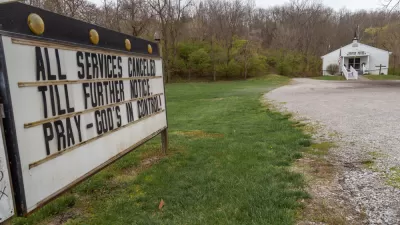As confirmed cases of COVID-19 increase rapidly throughout the nation, governors of Delaware, Louisiana, and Ohio on Sunday issued stay-at-home orders that take effect Monday night or Tuesday to protect residents and hospitals.

Delaware, Louisiana, and Ohio now join California, New York, Illinois, Pennsylvania, and Connecticut, where governors had taken the same action on Friday and Saturday, bringing the total number of Americans forced to shelter in place to 102 million. A fourth state, Nevada, also has a statewide order shutting down non-essential businesses, but it is enforced locally (see bottom of post).
As more residents rapidly become ill with the coronavirus, a surge on hospital capacity might overwhelm the healthcare delivery system, often referred to as the need to "flatten the curve." That scenario has already begun to develop in some hard-hit regions, particularly New York City.
The emergency action to address the coronavirus pandemic taken by Ohio Gov. Mike DeWine is particularly significant as it marks the first time a Republican governor has done so.
"DeWine had previously closed schools, bars, restaurants and other businesses and backed closing the polls in the state’s primary last week under a health emergency," report Mark Niquette and Hailey Waller for Bloomberg News. "But the outbreak has reached a new stage requiring more drastic actions, he said."
“We are certainly at war,” DeWine said at a press conference in Columbus. “In a time of war, we have to make sacrifices.”
Like Gov. Cuomo of New York, DeWine has effectively used televised press briefings to educate his constituents about the public health crisis, wrote Henry Gomez, a political reporter for BuzzFeed News based in Cleveland, Ohio
Citizens who don’t ordinarily tune in to state government are tuning in for DeWine’s daily press conferences. The afternoon briefings, where he relies on the expertise of his health director, a medical doctor with a master’s degree in public health, are appointment viewing
The order will go into effect beginning Monday, March 23, 2020, at 11:59 p.m. and will remain in effect until 11:59 p.m. on April 6, 2020, unless the order is rescinded or modified.
Louisiana
Just as DeWine is the first Republican governor to order a shutdown, the stay at home order by Democratic Gov. John Bel Edwards is the first issued by a southern state. It takes effect that goes into effect at 5 p.m. Monday.
“In Louisiana, we have taken aggressive measures to mitigate the spread of COVID-19 and flatten the curve; however, this is not enough," said Edwards.
"As our number of cases continue to grow, I am directing all Louisianans to stay at home unless it is absolutely necessary for you to leave. I am implementing this measure to help prevent you from becoming infected or infecting someone else."
The order is set to expire at the end of the night on Sunday, April 12. The Governor will re-evaluate the need for the statewide Stay at Home order and other mitigation measures currently in place to determine if they need to be extended beyond April 12.
Delaware
Gov. John Carney (D) stated four key reasons for strengthening the existing State of Emergency declaration which will take effect on Tuesday at 8 a.m.
- "We are starting to see an increase in COVID-19 cases in the state and we want to stem the rate of the community spread.
- "We are very concerned about the ability of our hospitals to handle a surge in patient volume.
- "Neighboring states have taken similar action and we don't want Delaware to become a destination for residents from other states seeking a more permissive environment."
Carney had been contacted by neighboring Gov. Phil Murphy (D) of New Jersey who had worked with the governors of New York, Connecticut and Pennsylvania in a regional effort to contain the pandemic.
- "Not enough people are taking the existing guidance seriously. I've seen way too many people in groups or gatherings," meaning people are not adhering to CDC social distancing guidelines.
Nevada
Finally, the Las Vegas Sun reports that "Metro Police on Saturday began enforcing Gov. Steve Sisolak’s order [issued Friday] that nonessential businesses temporarily shut down in an effort to mitigate the spread of the novel coronavirus." While the order, originally issued as guidance [pdf] on March 17, applies statewide, "he left it up to local governments to adopt their own enforcement," reports Ricardo Torres-Cortez.
The Clark County Commission convened for an emergency meeting a few hours later, delegating the authority to Metro through an ordinance.
Note that the enforcement applies to businesses, not residents who defy social distancing principles, which are included in the Nevada Health Response COVID-19 Risk Mitigation Initiative [pdf].
Related in Planetizen:
-
The New Regionalism of the Coronavirus Pandemic, March 19, 2020
FULL STORY: Delaware, Ohio, Louisiana Latest to Issue Stay-at-Home Order

Planetizen Federal Action Tracker
A weekly monitor of how Trump’s orders and actions are impacting planners and planning in America.

Chicago’s Ghost Rails
Just beneath the surface of the modern city lie the remnants of its expansive early 20th-century streetcar system.

San Antonio and Austin are Fusing Into one Massive Megaregion
The region spanning the two central Texas cities is growing fast, posing challenges for local infrastructure and water supplies.

Since Zion's Shuttles Went Electric “The Smog is Gone”
Visitors to Zion National Park can enjoy the canyon via the nation’s first fully electric park shuttle system.

Trump Distributing DOT Safety Funds at 1/10 Rate of Biden
Funds for Safe Streets and other transportation safety and equity programs are being held up by administrative reviews and conflicts with the Trump administration’s priorities.

German Cities Subsidize Taxis for Women Amid Wave of Violence
Free or low-cost taxi rides can help women navigate cities more safely, but critics say the programs don't address the root causes of violence against women.
Urban Design for Planners 1: Software Tools
This six-course series explores essential urban design concepts using open source software and equips planners with the tools they need to participate fully in the urban design process.
Planning for Universal Design
Learn the tools for implementing Universal Design in planning regulations.
planning NEXT
Appalachian Highlands Housing Partners
Mpact (founded as Rail~Volution)
City of Camden Redevelopment Agency
City of Astoria
City of Portland
City of Laramie





























